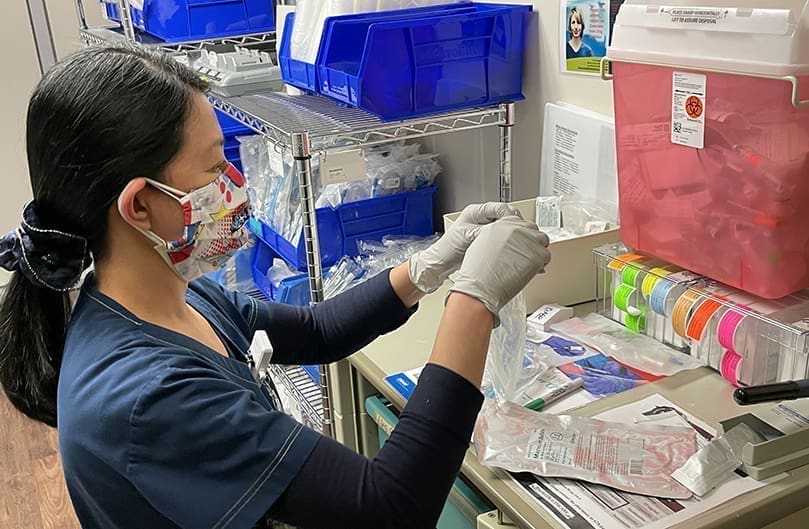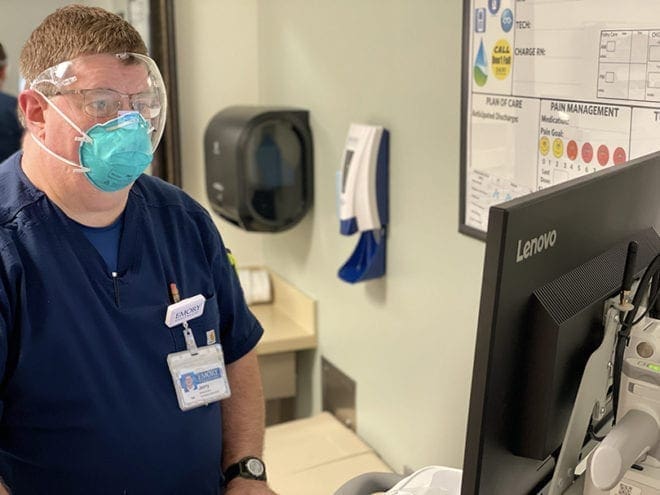 Photo Courtesy of Emory Saint Joseph Hospital
Photo Courtesy of Emory Saint Joseph HospitalAtlanta
Despite challenges, healthcare workers are hopeful at Atlanta’s Catholic hospital
By SAMANTHA SMITH, Staff Writer | Published March 18, 2021
ATLANTA—This past year working as an acute care nurse at Emory Saint Joseph’s Hospital during the COVID-19 pandemic reminded Carmen Seso that God is in control.
“My faith in God was made stronger because he is showing up in my job, like, telling me that I am limited, but he is not,” said Seso, parishioner at St. Catherine of Siena Church in Kennesaw. Patients who rely on God for their well being don’t give up on themselves, she said.
“It has an impact to know that it’s not just you who believes, who relies on the supernatural power of God,” said Seso. “That makes the workplace better.”
The first cases of the coronavirus in Georgia were found in early March of last year. On March 11, 2020, the World Health Organization declared COVID-19 a pandemic. Since that time, staff of the first faith-based hospital in Atlanta have been working diligently and rigorously as hundreds have come seeking treatment for complications resulting from the coronavirus.
There has been an overwhelming volume of patients, said William Bender, MD, MPH, site director for critical care at Emory Saint Joseph’s Hospital and assistant professor in the Division of Pulmonary, Allergy, Critical Care and Sleep Medicine at Emory University School of Medicine. He has worked at the hospital since 2015.
With work in the ICU, the emergency room or anything like that, days and weeks are incredibly busy, but there are brief respites and things get lighter, said Dr. Bender.
“But with the pandemic and with the COVID population, and in particular the critically ill COVID population, it’s just been a non-stop barrage of a large number of incredibly sick patients.”
In the January peak, almost a third of hospital beds were occupied by COVID patients, according to federal data. Emergency workers in the intensive care unit that month had on average 23 beds a week occupied by adults with COVID-19.
“The daily grind of death and disease—it’s so widespread and then the volume and then the extended period of time were just not easy to adjust to,” said Father Patrick Scully, chaplain at the hospital. He has served there since 2017.
Along with the grueling hours, patients not being with their families has been a hardship for healthcare workers. Before the pandemic, family members were allowed to be with their loved ones in ICU at their bedside, but that has changed, explained Dr. Bender.
“That’s been really challenging trying to communicate on a daily basis with loved ones, trying to communicate the level of illness that their loved ones have, what the road ahead looks like, how sick they are, and also trying to convey the loved ones’ empathy and sympathy, and thoughts and prayers and everything to their loved ones who are in the hospital,” said the doctor.
Chaplains are not permitted to touch or hug patients, said Father Scully.
“Even smiles are hidden. That’s one of our primary ways of being with people, with a lot of those non verbals,” said the priest.

Jerry deVarennes, BSN-RN, works at a nursing terminal in the Cardiovascular Step Down Unit at Emory Saint Joseph Hospital, Atlanta, where he is the unit charge nurse. As a parishioner at Transfiguration Church in Marietta, he believes the vaccines serve as a sign of hope. Photo Courtesy of Emory Saint Joseph Hospital
Because of how the virus spreads, chaplains must be careful how much time they spend with patients. A lot of chaplaincy is sharing the joy and getting to know the patient, said Father Scully.
“But it seems like we just run from death to death to death,” he said.
In addition to the work, extra precautions are being taken to make sure we don’t bring the virus to our families, said Jerry deVarennes, a unit charge nurse at the hospital. He is a parishioner at Transfiguration Church in Marietta.
COVID-19 is real, said deVarennes, who has seen surges of patients at the hospital after the Thanksgiving and Christmas holidays.
“The more that the community can work, as far as wearing their mask and social distancing, it does make a difference.”
And yet, despite all that hospital staff have faced this past year, there is still hope.
Watching patients become survivors of the virus has been uplifting for Seso.
“When we bring patients down because they survived … we clap for them, we congratulate them,” she said. “That’s a very good reason for us to come back and do what we do again.”
The staff has been a great support to each other, especially when things are rough, said deVarennes, who has worked at the hospital for seven years.
“It’s been incredibly uplifting and it’s been a pretty big motivating factor to just work with a team that day in and day out, no matter how bad it is going, to do everything possible to take care of these patients,” said Dr. Bender. “Being part of that kind of healthcare family has really motivated me and I know it’s kind of motivated everyone else as well.”
There is a long history of the Catholic Church facing this type of crisis in history, said Father Scully. According to the Catholic Health Association, there are more than 600 hospitals and 1,600 long-term care and other facilities in the United States.
Religious orders have worked in healthcare for centuries. This includes the Sisters of Mercy, who founded Emory Saint Joseph’s Hospital more than 140 years ago.
“History helps frame a bigger picture, or gives us greater perspective,” said the priest. “Prior to our day and age, people died all the time from tuberculosis or even the flu. The rule is death by disease—young, old and everyone in between for most of human history, recorded and unrecorded. We’re very, very fortunate, very, very blessed to live when we do and have hospitals like we do.”
The vaccine availability is the “light at the end of the tunnel,” said deVarennes. “Getting the vaccine makes a difference.”